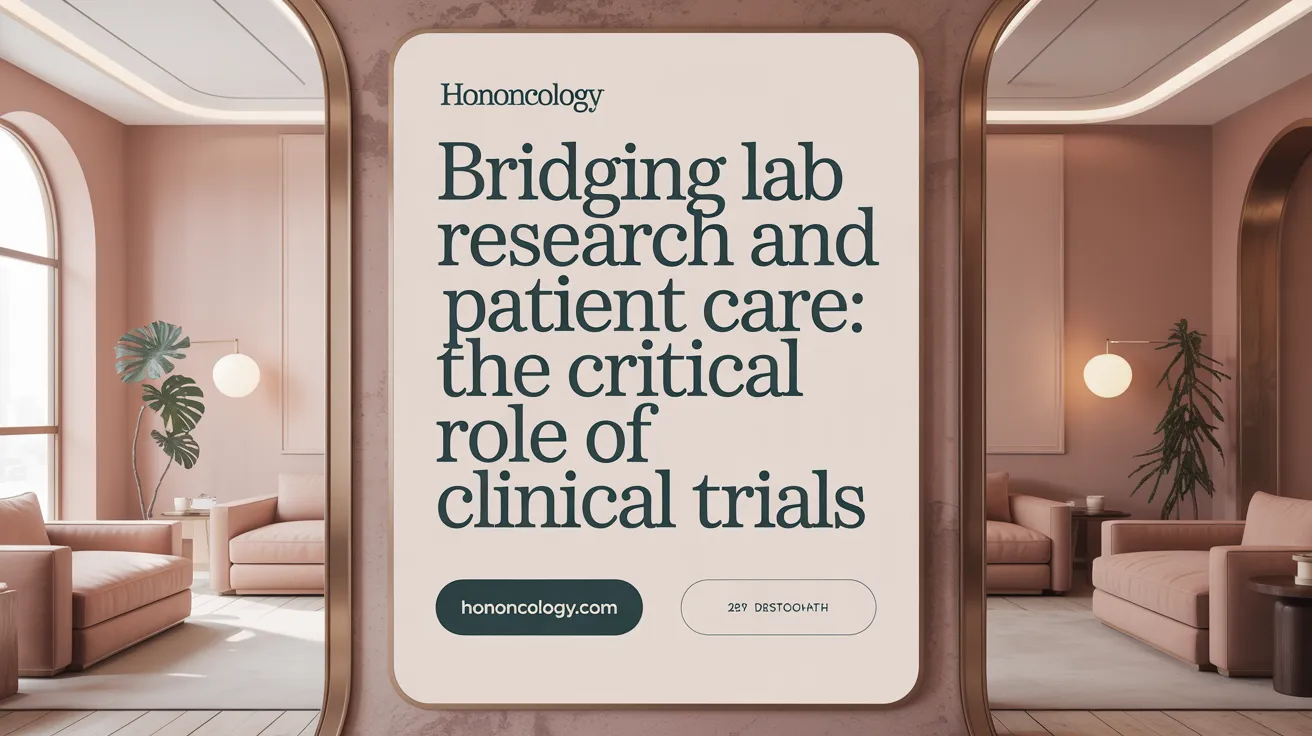Introduction to Clinical Trials and Their Role in Cancer Treatment
What Are Clinical Trials?
Clinical trials are structured research studies conducted with human participants to evaluate new medical treatments, drugs, procedures, or strategies. They are essential in cancer research to test the safety, effectiveness, and side effects of novel therapies before these are approved for general use.
Phases of Clinical Trials
Clinical trials progress through several phases to ensure rigorous evaluation:
- Phase I: Focuses on safety and determining the appropriate dosage.
- Phase II: Tests the effectiveness of the treatment and monitors side effects.
- Phase III: Compares the new treatment with standard therapies to assess overall benefit.
- Phase IV: Conducted after approval, monitoring long-term effects and safety.
Why Are Clinical Trials Crucial in Cancer Care?
Clinical trials are the backbone of advancements in cancer treatment. They enable the development of cutting-edge therapies, including targeted drugs and immunotherapies, which have significantly improved patient outcomes. Participation allows patients early access to innovative treatments and ensures new therapies are safe and effective for diverse populations. Thanks to clinical trials, therapies that once were experimental have become the standard of care, fueling continual improvements in survival rates and quality of life for cancer patients worldwide.
The Framework and Phases of Cancer Clinical Trials

What Are the Phases of Cancer Clinical Trials and Their Objectives?
Cancer clinical trials typically proceed through four distinct phases, each designed to ensure safety, effectiveness, and comparative value of new treatments before they become standard care. Learn more in this overview of Phases of cancer clinical trials.
- Phase I: Focuses primarily on safety and determining the appropriate dosage of a new drug or treatment. This phase involves a small number of patients and assesses how the treatment is absorbed and tolerated. See details about Phase I safety testing.
- Phase II: Evaluates the effectiveness and side effects of the treatment in a larger group of patients, providing insight into both efficacy and toxicity. More on Phase II effectiveness testing.
- Phase III: Compares the new treatment with existing standard therapies in a wider patient population to confirm its benefits and monitor adverse effects. Successful outcomes in this phase often lead to regulatory approval. Learn about Phase III comparative effectiveness.
- Phase IV: Conducted after a treatment is approved, this phase monitors long-term effects and effectiveness in the general population. Explore long-term monitoring in Phase IV trials.
What Types of Clinical Trials Exist?
Cancer clinical trials are diverse, each targeting different aspects of cancer care and management. A comprehensive description of Types of cancer clinical trials includes:
- Treatment Trials: Investigate new drugs, drug combinations, or novel surgical or radiation techniques. These are the most common and focus on evaluating new therapeutic approaches.
- Prevention Trials: Focus on strategies to reduce cancer risk in high-risk populations or prevent recurrence.
- Screening Trials: Evaluate new methods for early cancer detection before symptoms appear.
- Supportive Care Trials: Aim to improve quality of life by managing side effects, pain, nutrition, or stress associated with cancer and its treatment. See details in Supportive and palliative care trials.
How Do Clinical Trials Bridge Laboratory Research and Patient Care?
Clinical trials serve as the critical link translating discoveries from laboratory research into practical therapies for patients. Laboratory studies identify promising treatments, which are then rigorously tested through clinical trials to ensure safety and effectiveness in humans. Through this process, clinical trials provide vital insights into how treatments perform within the complex human body and tumor microenvironment, refining strategies for personalized medicine based on genetic and molecular tumor profiles. Learn about translating lab research to clinical care.
Ultimately, they establish new standards of care that improve survival rates and quality of life for cancer patients. The role of clinical trials in developing advanced, personalized cancer therapies is detailed in The importance of clinical trials.
This structured framework and diverse trial types ensure continuous advancement in cancer treatment, combining scientific innovation with patient-focused care. For an overview of clinical trials and their significance in cancer care, see the National Cancer Institute resources.
Access to Innovative Therapies and Enhanced Patient Care Through Clinical Trials

Access to Latest Therapies Not Widely Available Outside Trials
Clinical trials provide cancer patients with access to some of the most recent and innovative treatments that are often not yet accessible through standard care channels. These therapies can include advanced immunotherapies, targeted drugs, and novel drug combinations that are still under evaluation. By participating in trials, patients may receive Benefits of cancer clinical trials that could potentially improve their outcomes.
Close Monitoring and Frequent Assessments During Trials
Patients enrolled in clinical trials benefit from enhanced medical oversight compared to typical treatment pathways. Trials commonly involve more frequent clinic visits, regular imaging tests, and detailed health assessments. This close monitoring ensures careful evaluation of treatment responses and side effects, offering patients reassurance and the opportunity for prompt management of any issues (Benefits of clinical trials for cancer).
Cost Coverage of Experimental Treatments and Insurance Aspects
Most clinical trials cover the cost of experimental drugs and therapies, significantly reducing the financial burden on participants. While many ancillary expenses such as travel or some imaging tests might not be fully covered, insurance often pays for standard medical procedures related to the trial. This financial support allows patients easier access to innovative treatments without the usual cost barriers (Clinical trials for cancer patients).
Patient Benefits Including Safety Oversight and Quality of Life Improvements
Participation in clinical trials offers multiple patient-centered advantages. The research teams closely track safety to manage potential adverse effects proactively, which protects patient well-being. Moreover, trials frequently explore treatments that aim to improve patients' quality of life by targeting disease control with fewer or more manageable side effects. Participants also contribute to advancing scientific knowledge, potentially benefiting future patients with similar conditions (Writing on patient-reported outcomes in cancer trials).
By joining a clinical trial, cancer patients gain privileged access to the forefront of medical science, receive attentive care, and support the development of tomorrow's therapies, all while often alleviating the financial costs associated with novel treatments (Benefits of Cancer Clinical Trials).
Clinical Trials as Drivers of Medical Breakthroughs in Cancer Treatment
Historical milestones achieved through clinical trials
Clinical trials have been pivotal in landmark achievements over cancer history. They have enabled the development of early surgical interventions, such as radical mastectomy introduced in the 19th century, and have helped identify carcinogenic risks from chemicals and viruses. These trials laid the groundwork for cancer prevention and treatment standards. For more on these milestones, see History of cancer research.
Development of targeted therapies, immunotherapies, and personalized medicine
The evolution of cancer treatment owes much to clinical trials that validated targeted therapies like trastuzumab for HER2-positive breast cancer and imatinib for chronic myeloid leukemia. Immunotherapies, including checkpoint inhibitors such as pembrolizumab and nivolumab, emerged from rigorous clinical testing and now offer durable remissions for certain hard-to-treat cancers. Personalized medicine advances through genomic profiling and biomarker-guided trials, tailoring therapies to the genetic makeup of individual tumors. This approach increases efficacy and reduces toxicity compared to traditional one-size-fits-all treatments. Learn more about these innovations and trial phases in The importance of clinical trials in developing cancer therapies and History of cancer research milestones.
Recent advances including cancer vaccines, PARP inhibitors, and CAR-T therapies
Clinical trials have propelled recent innovations, including therapeutic cancer vaccines like ELI-002 cancer vaccine targeting KRAS which showed significant relapse risk reduction in KRAS-mutant pancreatic and colorectal cancers. PARP inhibitors targeting DNA repair deficiencies, such as saruparib, have improved outcomes in breast cancer patients. Cell-based therapies like CAR-T and CAR NK cells with CD28 co-stimulation demonstrate promising persistence and activity against solid tumors and hematologic cancers, marking a new frontier in cancer immunotherapy. These advances highlight the critical role of clinical trials in translating scientific discoveries into life-saving treatments. For recent research highlights, see 11 New Research Advances in Cancer.
Patient Outcomes and Measurements in Cancer Clinical Trials
Measuring Success in Cancer Clinical Trials
Cancer clinical trials use specific measures called clinical trial endpoints in cancer treatment to evaluate the effectiveness of new treatments. Two of the most important clinical endpoints are overall survival (OS) and progression-free survival (PFS). Overall survival measures the time a patient lives from the start of treatment until death from any cause, making it the gold standard to assess treatment success. Progression-free survival tracks how long a patient remains alive without the cancer worsening, often indicating whether the treatment delays disease progression and symptoms.
The Role of Patient-Reported Outcomes
Patient-reported outcomes (PROs) have become increasingly important in cancer trials. PROs allow patients to report directly on symptoms, side effects, and quality of life without interpretation by healthcare providers. This direct feedback provides a fuller picture of how patients experience their treatment and helps researchers understand tolerability and overall impact. Tools like the PRO-CTCAE questionnaire systematically capture patients' reports on symptomatic side effects, enhancing the validity of safety data.
Benefits of Trial Participation on Disease Control and Survival
Participation in clinical trials for cancer patients has been linked to improved outcomes for cancer patients. Studies show that trial participants often experience better disease control, including higher response rates and longer progression-free survival. Access to cutting-edge treatments, more intensive monitoring, and early identification of complications contribute to these benefits. While overall survival improvements vary, some patient groups, such as women with advanced cervical cancer, have demonstrated higher response rates and reduced progression due to clinical trial involvement.
In summary, evaluating both clinical endpoints and patient-reported outcomes offers a comprehensive assessment of cancer treatments. Participating in clinical trials not only advances scientific knowledge but can also positively impact individual patient outcomes.
Barriers to Clinical Trial Participation and Strategies for Improvement
Why Are Adult Enrollment Rates in Clinical Trials Low Compared to Pediatric Trials?
Adult cancer patients have notably low enrollment rates in clinical trials, with fewer than 5% participating despite many expressing willingness. In contrast, over 50% of pediatric cancer patients enroll in trials. This disparity contributes to faster treatment advancements and better survival outcomes in children, highlighting a gap needing urgent attention for adults. For further details, see clinical trial participation in cancer research.
What Structural, Clinical, and Attitudinal Barriers Affect Participation?
Barriers to clinical trial participation arise from several sources:
- Structural Barriers: Limited availability of relevant trials, geographic access, and insurance issues prevent many adults from enrolling. Nearly half of adults considered for trials find no suitable studies.
- Clinical Barriers: Strict eligibility criteria exclude about 18% of potential participants, especially those with comorbidities.
- Attitudinal Barriers: Patients may fear side effects, placebo use, or additional burdens such as travel. Physician hesitation, due to perceived complexity or potential impact on patient care, also lowers referral rates.
Read more about these barriers to cancer clinical trial enrollment.
How Do Socioeconomic and Demographic Factors Influence Trial Participation?
Participation disparities exist along various lines:
- Lower income, older age, and minority status are associated with reduced enrollment.
- Adolescent and young adult patients have the lowest trial participation, correlating with slower survival improvements.
- Mistrust in the healthcare system and informational gaps further limit enrollment among underserved groups.
These issues are explored in addressing demographic disparities in trial enrollment and disparities in clinical research and cancer treatment.
What Efforts Are Being Made to Improve Diversity and Inclusivity?
Various strategies address these challenges:
- Expanding trials globally and harmonizing standards for broader reach.
- Utilizing social media and digital campaigns for recruitment.
- Simplifying eligibility criteria, especially for older adults.
- Providing financial and logistical support.
- Engaging underserved populations through community outreach.
These actions are designed to increase enrollment, enhance the representativeness of trial results, and ultimately improve cancer outcomes across all demographics. Examples and strategies can be found in strategies to improve cancer clinical trial participation and improving clinical trial participation.
The Role of Physician and Patient Education in Enhancing Trial Participation
Why is patient knowledge and understanding important in clinical trial participation?
Patient knowledge about clinical trials is a critical factor in their willingness to enroll. Studies have shown that individuals with better understanding and information about trials are significantly more likely to participate. Unfortunately, many patients report low awareness, with nearly 60% indicating little to no knowledge about clinical trials. When patients comprehend the purpose, processes, and potential benefits of trials, they are more motivated to consider participation. For more details, see Understanding Clinical Trials Among Patients and Clinical trials in cancer treatment.
How do healthcare provider communication and trust influence trial enrollment?
Trust in healthcare providers, especially oncologists, plays a central role in patients' decisions to join trials. Clear, empathetic communication from physicians helps dispel myths and alleviate concerns. Patients prefer receiving information from trusted medical professionals and value ongoing updates about trial results. The physician’s endorsement can counterbalance fears and encourage patients to view clinical trials as a viable option for their care. Learn more at Role of Physicians in Clinical Trial Participation and Clinical trials in cancer care.
What fears do patients commonly have, and how can they be addressed?
Common patient concerns include fears of side effects, receiving a placebo instead of active treatment, and privacy issues. Addressing these fears head-on with transparent information about safety measures, the rarity of placebo-only groups, and protections for personal data is essential. Clarifying that many trials provide the current standard therapy alongside experimental treatments can reduce anxiety about being part of untested care. Additional insights are available at Safety and Placebo Use in Clinical Trials and Clinical Trials and Immunotherapy.
What educational interventions improve clinical trial participation?
Educational efforts that include comprehensive discussions, written materials, and digital resources can effectively improve understanding. Transparency about trial goals, risks, and benefits, coupled with reassurance about ethical oversight, cultivates confidence. Tailored educational programs that respect patient concerns and cultural backgrounds are crucial to enhancing recruitment and ensuring diverse participation. Further information can be found at Educational Efforts to Improve Clinical Trial Recruitment and Strategies to improve cancer clinical trial participation.
Together, physician guidance and patient education serve as powerful tools to overcome barriers and foster greater involvement in cancer clinical trials, ultimately advancing treatment options for all patients. For a broader perspective on the importance of clinical trials, see Importance of Clinical Trials in Cancer Treatment and Clinical trials in cancer treatment.
Innovative Trial Designs and Emerging Methodologies in Cancer Research
Adaptive, Biomarker-Guided, Decentralized, and Real-World Evidence Trials
Innovations in clinical trial design have introduced adaptive trials, which allow modifications in protocols based on interim data, improving flexibility and patient safety. Biomarker-guided trials personalize treatment by selecting patients based on genetic or molecular tumor features, enhancing therapy effectiveness. Decentralized trials use technology to reduce the need for site visits, making participation more accessible and patient-friendly. Real-world evidence trials incorporate data from everyday clinical practice to complement traditional trials, enabling broader and more relevant insights into treatment effectiveness and safety.
Use of Machine Learning to Improve Trial Generalizability and Patient Selection
Machine learning (ML) techniques are increasingly used to address challenges in trial generalizability in oncology. Advanced ML models can predict patient mortality risk and categorize patients into prognostic groups, aiding in better patient selection and tailoring of treatments. Frameworks like TrialTranslator emulate randomized controlled trials using real-world data to evaluate treatment effects across diverse prognostic phenotypes, ensuring trial results are more applicable to typical patients beyond strict eligibility criteria.
How Evolving Trial Designs Increase Efficiency and Patient-Centricity
The integration of adaptive designs, biomarkers, ML models, and decentralized approaches markedly enhances clinical trial efficiency by speeding up enrollment and reducing unnecessary tests. These methods also improve patient-centricity by offering targeted therapies tailored to individual profiles, easing participation burdens, and focusing on outcomes meaningful to patients, such as quality of life and side effect management (patient-reported outcomes in cancer trials. Such progressive designs hold promise for accelerating new treatment development while ensuring trials are more inclusive, ethical, and responsive to patient needs (importance of clinical trials).
Global and Institutional Efforts to Expand Clinical Trial Access and Impact
International collaborations and harmonization of trial standards
Global strategies aim to expand clinical trial participation in cancer research by harmonizing standards across countries. Efforts include international collaboration in cancer clinical trials that streamline regulatory processes and trial designs, enabling quicker patient enrollment and broader data collection. These collaborations enhance the development of new therapies applicable to diverse populations.
Role of comprehensive cancer centers like Winship and Rutgers Institutes
Institutions such as the Winship Cancer Institute of Emory University and Rutgers Cancer Institute play leading roles in cancer research with hundreds of active trials. Winship offers over 550 ongoing trials, covering nearly every cancer type, and integrates multidisciplinary cancer research teams for patient care and research. Rutgers maintains more than 280 active trials and boasts high enrollment rates, particularly with 17% of adults and 70% of pediatric patients participating, surpassing national averages. These centers contribute significantly to advancing cancer treatments and extending patient survival.
Community engagement and outreach to underserved populations
Addressing disparities in trial participation is a priority through community outreach and education initiatives. Engagement programs focus on overcoming barriers faced by minorities, rural residents, older adults, and low-income groups by improving access, building trust, and providing resources. Social media and targeted campaigns are increasingly used to raise awareness and facilitate enrollment, supporting efforts to improve clinical trial diversity.
Collectively, these global and institutional efforts accelerate role of accrual in accelerating cancer treatment development, improve the Trial generalizability in oncology, and enhance impact of pediatric clinical trial enrollment on treatment advancements.
The Future of Cancer Treatment Hinges on Clinical Trial Participation

Why Is Participation Crucial for Drug Development and Approval?
Clinical trials are the cornerstone for developing new cancer therapies. Without sufficient patient enrollment, the testing and validation of innovative treatments slow down significantly. Participation accelerates drug approval by providing the essential safety and efficacy data needed to bring breakthrough therapies from the lab to the clinic as detailed in importance of clinical trials and the importance of clinical trials in cancer therapy development.
How Do Trials Support Precision Medicine and Tailored Treatments?
Clinical trials enable the exploration of therapies targeted to specific genetic markers or tumor profiles, a practice central to precision medicine. By including diverse patient populations and analyzing individual responses, trials help customize treatments that improve outcomes and reduce side effects, as explained in advances in personalized cancer vaccines and targeted therapies and genomic analysis uncovering mutational signatures.
What Role Does Trial Data Play in Setting New Standards of Care?
Results from well-conducted clinical trials inform updates to treatment guidelines and establish new standards of care. This leads to improved patient survival and quality of life as therapies proven more effective or safer replace outdated approaches, as described in clinical trial outcomes and endpoints and benefits of clinical trial participation.
In summary, robust clinical trial participation is essential for cancer therapy advancements. It ensures faster development, evaluation, and adoption of innovative, personalized treatments that ultimately transform patient care and survival prospects, as highlighted by resources on clinical trial participation benefits and importance of clinical trials in cancer treatment.
Conclusion: Empowering Patients and Advancing Care through Clinical Trials
The Vital Role of Clinical Trials in Cancer Treatment
Clinical trials are the cornerstone of progress in cancer care. They evaluate new therapies, improve existing treatments, and bring innovative options to patients, often before these options are widely accessible. Through rigorous phases of testing, clinical trials ensure treatments are safe and effective, establishing new standards of care that benefit not only participants but the broader patient community.
Encouraging Patient Participation and Informed Choices
Patient involvement is essential to the success of clinical trials. Engaging patients in informed discussions with their healthcare teams encourages participation, which can offer access to cutting-edge treatments and closer medical monitoring. Awareness and understanding of clinical trials can empower patients to make confident decisions about their care, helping them contribute to the scientific advances that improve cancer outcomes.
Sustaining Progress through Research and Collaboration
Sustained patient enrollment and diverse participation across demographic groups are critical to accelerating treatment breakthroughs. Continued research, combined with global and local efforts to reduce barriers, promises improved survival rates and quality of life for future patients. Empowering patients and advancing cancer care go hand in hand through the vital pathway of clinical trials.





.png)


.png)
.png)




